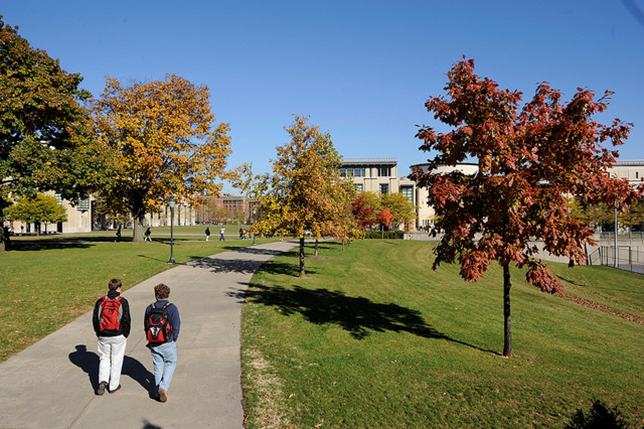Carnegie Mellon and City of Pittsburgh Launch Network for City-University Joint Tech Projects

Carnegie Mellon has a history of successful joint technology projects with the City of Pittsburgh. (Photo: Copyright Carnegie Mellon University. All rights reserved.)
A new city-university partnership network will research, develop and deploy technologies to improve urban infrastructure, city services and civic engagement. Carnegie Mellon University and the City of Pittsburgh have teamed up as the founding members of the MetroLab Network, an alliance among 20 metro areas and more than 25 neighboring universities focused on the challenges facing urban areas in the U.S. CMU received a $1 million grant from the MacArthur Foundation to launch the initiative.
"In the spirit of collaboration, Carnegie Mellon is excited to take a leading role in the founding of the MetroLab Network," said CMU Provost Farnam Jahanian in a press release. "This effort builds on decades of research supported by federal agencies, private foundations and industry collaboration to create solutions that improve urban areas and provide real benefits to the public. We are eager to participate and work together with the other members of the network to develop and deploy technologies capable of creating a brighter future for our cities."
"The MetroLab Network will catalyze research, development and demonstration projects that will benefit urban residents, environments and communities," commented Alaina Harkness, program officer for the MacArthur Foundation. "Working together, the network partners will pool knowledge, share resources and boost their collective ability to make cities work better."
The concept of the MetroLab Network is based on a history of successful joint projects between Carnegie Mellon and the City of Pittsburgh. Some examples include:
- A smart traffic signalization project developed by CMU's Robotics Institute and tested on Pittsburgh streets, which decreased the travel time at the tested intersections by 25 percent;
- A CMU College of Engineering project that used Allegheny County's Port Authority light rail vehicles as sensors to monitor track and bridge conditions and identified locations on the track needing attention;
- The Open Source Predictive Analytics 311 project, led by CMU's H. John Heinz III College, which uses 311 call data to create more responsive public service systems; and
- The Pulse of Allegheny County project, in which CMU's Electrical and Computer Engineering Department monitored Pennsylvania Department of Transportation video cameras to understand traffic flows in and out of Pittsburgh.
Cities and universities that participate in the MetroLab Network will be required to "develop a memorandum of understanding between home metro partners, designate representatives responsible for maintaining the collaboration with the MetroLab Network, and host an active set of research, development and deployment projects."
For more information, visit the MetroLab Network site.
About the Author
Rhea Kelly is editor in chief for Campus Technology, THE Journal, and Spaces4Learning. She can be reached at [email protected].